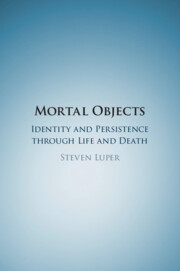Book contents
- Mortal Objects
- Mortal Objects
- Copyright page
- Contents
- Acknowledgments
- Introduction
- Chapter 1 Material Objects
- Chapter 2 Conformism
- Chapter 3 Organisms
- Chapter 4 Incregratism
- Chapter 5 Selves
- Chapter 6 The Cogito
- Chapter 7 Living and Dying
- Chapter 8 Welfare and Nonexistence
- Chapter 9 What We Can Become
- Chapter 10 (Re)making Ourselves
- Chapter 11 The Meaning of Life and Death
- References
- Index
Chapter 4 - Incregratism
Published online by Cambridge University Press: 27 January 2022
- Mortal Objects
- Mortal Objects
- Copyright page
- Contents
- Acknowledgments
- Introduction
- Chapter 1 Material Objects
- Chapter 2 Conformism
- Chapter 3 Organisms
- Chapter 4 Incregratism
- Chapter 5 Selves
- Chapter 6 The Cogito
- Chapter 7 Living and Dying
- Chapter 8 Welfare and Nonexistence
- Chapter 9 What We Can Become
- Chapter 10 (Re)making Ourselves
- Chapter 11 The Meaning of Life and Death
- References
- Index
Summary
The account of organisms I offer in one chapter clashes with the account of objects I offer in another. To resolve the clash, we could say that there are two sorts of objects, mere objects with the composition and persistence conditions supplied by the incrementist account, and organisms with organismal criteria, as supplied by the integratist account. However, this solution forces us to give up the non-overlap principle, which says that objects cannot overlap: they can never be made up of the same constituents at the same time (although one may be a proper part of the other). A solution that is consistent with the non-overlap principle is to say that the criteria of composition and persistence for objects are disjunctive, in that although an object may persist organismally and incrementally at once, it may continue to survive, after ceasing to persist organismally, if it meets the incrementist criteria. To deal with possible branching cases, and to avoid the possibility of things assimilating organisms, we will also need to add that organismal criteria trump incrementist criteria.
Keywords
- Type
- Chapter
- Information
- Mortal ObjectsIdentity and Persistence through Life and Death, pp. 63 - 75Publisher: Cambridge University PressPrint publication year: 2022

